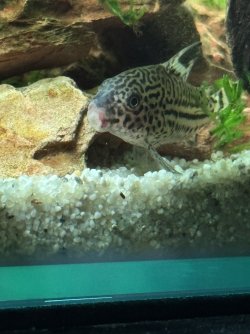Not sure if the fish is still alive but it has a bacterial infection on the mouth. It doesn't look like mouth fungus (Columnaris) but it has an infection.
Waterlife Myxazin or Triple Sulpha (Tri Sulfa) should fix it.
---------------------
To work out the volume of water in the tank:
measure length x width x height in cm.
divide by 1000.
= volume in litres.
There are 3.785 litres in a US Gallon
There are 4.5 litres in a UK gallon
There is a calculator/ converter in the "FishForum.net Calculator" under "Useful Links" at the bottom of this page that will let you convert litres to gallons if you need it.
When you measure the height, measure from the top of the substrate to the top of the water level.
If you have big rocks or driftwood in the tank, remove these before measuring the height of the water level so you get a more accurate water volume.
You can use a permanent marker to draw a line on the tank at the water level and put down how many litres are in the tank at that level.
---------------------
Wipe the inside of the glass down with a clean fish sponge. This removes the biofilm on the glass and the biofilm will contain lots of harmful bacteria, fungus, protozoans and various other microscopic life forms.
Do a 75% water change and gravel clean the substrate. The water change and gravel cleaning will reduce the number of disease organisms in the water and provide a cleaner environment for the fish to recover in. It also removes a lot of the gunk and this means any medication can work on treating the fish instead of being wasted killing the pathogens in the gunk.
Make sure any new water is free of chlorine/ chloramine before it is added to the tank.
Clean the filter if it hasn't been done in the last 2 weeks. However, if the filter is less than 6 weeks old, do not clean it. Wash the filter materials/ media in a bucket of tank water and re-use the media. Tip the bucket of dirty water on the garden/ lawn. Cleaning the filter means less gunk and cleaner water with fewer pathogens so any medication (if needed) will work more effectively on the fish.
Remove carbon from the filter before treating with chemicals or it will adsorb the medication and stop it working.
Increase surface turbulence/ aeration to maximise the dissolved oxygen in the water. Most fish medications reduce the oxygen carrying capacity of water so extra aeration helps the fish.



